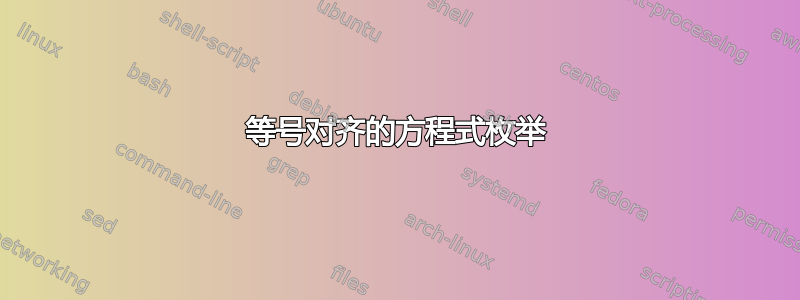
我想要如下内容:
\begin{enumerate}
\item $1 + 1 = 2$
\item $1 = 2 - 1$
\end{enumerate}
问题是,我也希望等号对齐。但我希望左侧最宽的等式从项目编号后面开始,就像该行是文本一样。
笔记:我试图陈述一个包含多个部分的定理,每个部分最容易用一个方程来陈述。显然,如果我只关心最小工作示例以上,我最好使用对齐环境和方程式编号。有没有合理的方法来做到这一点?
答案1
\usepackage{array}
\newenvironment{enumalign}
{\par\addvspace{\topsep}\setcounter{enumi}{0}
\noindent$\begin{array}{@{}r@{\hspace{\labelsep}}r@{}>{{}}l@{}}}
{\end{array}$\par\addvspace{\topsep}}
\newcommand{\eitem}{\stepcounter{enumi}\makebox[\labelwidth][r]{\theenumi.}&}
\begin{document}
\begin{enumalign}
\eitem 1+1&=2\\
\eitem 1&=2-1
\end{enumalign}
记得用\\
答案2
\documentclass[leqno]{report}
\usepackage{amsmath}
\begin{document}
\begin{flalign}
1 + 1 &= 2 &\\
1 &= 2 - 1
\end{flalign}
\end{document}

答案3
您可以使用它\hphantom来获取对齐所需的空间:
\documentclass{article}
\usepackage{mathtools}
\begin{document}
\begin{enumerate}
\item $1 + 1 = 2$
\item $\hphantom{1+1}\mathllap{1} = 2 - 1$
\end{enumerate}
\end{document}
答案4
\item我尝试过一次(并且惊讶地发现它确实有效)在\intertext嵌套环境中使用align:
\begin{enumerate}
\item First point, blah
\begin{align}
a &= b+2 \\ %% not sure about whether those \\ are needed or not
\intertext{\item Second point, blah}
b &= c+3
\end{align}
\end{enumerate}


